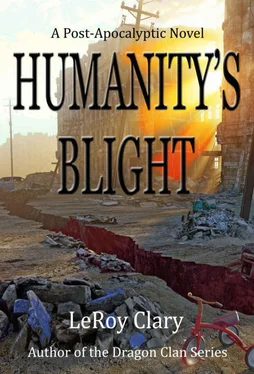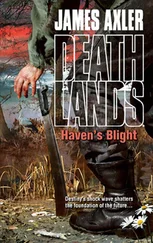I turned it on and was instantly greeted with squeals and howls. I changed stations slowly and waited a short time at each station to listen. On one channel we heard a man talking. He seemed to be instructing or ordering someone in a gruff tone. He spoke in English, his voice clipped and harsh, but I didn’t understand the direction he gave. A new voice, one much louder and clearer replied, “We’re in position.”
“What are you waiting for?” The reply was sneering with contempt. “Go get them.”
Sue called out, “Something’s going on, better come up here.”
I ran up the ladder and looked where she pointed. The small city on the shore crackled with gunfire. An explosion sounded and a plume of gray smoke rose into the air. More gunfire, not just ten or twenty shots, but hundreds, from many different weapons.
We stood transfixed. Another explosion, then another. More smoke. More gunfire.
Sue hissed, “They’re killing each other. It’s a war. The people still alive are trying to kill everyone else. What are they thinking? Has the whole world gone crazy?”
I turned on the radar and found we were still alone. That last radio message bothered me, and my mind returned to it time and again. Could we be what they were supposed to go get? It was late in the day. My plan of waiting until three in the morning didn’t seem as good as it had a while ago. The gunfire continued, sporadic at best, broken often by either silence or bursts of shots. I estimated several hundred rounds had been fired by an unknown number of weapons.
“It’s a war,” I said in agreement. “They should be pulling together instead of killing each other.”
“There’s crazy people over there if you ask me,” she said in a voice that was almost a sob. “Don’t take us near them.”
She was right about them, and probably there were dozens of them, judging from the amount of gunfire. No telling what or who the sighting of our boat might attract. In my experience with the flu so far, a few hundred survivors would account for nearly all the people alive in the town we watched, and it seemed every one of them was busy trying to reduce that number by half. It was depressing. Soon, there would be fewer people everywhere. Darrington, Marysville, Everett and probably everywhere else.
My experience also said to stay away from people. All of them. I was about to tell Sue to start the engine and get us away.
However, another glance at the radar showed the line of boats hadn’t shifted and a sweep with the binoculars confirmed no boats from the city were coming our way. However, a new blip on the screen was approaching us from the front. I looked up and found a small white sailboat, maybe twenty feet long, with no sail raised, using its outboard motor to steer directly at us. It did nothing to hide its approach.
“What do we do?” Sue asked in a hushed voice.
“Nothing. Keep our guns where we can get to them. In fact, let them see the shotgun, that should keep them from coming too close.”
“Why not run?”
“To where? Besides, it’s small, big enough for maybe four people, at most. If they were planning an attack of some sort, they wouldn’t be coming right at us like that, and it looks like the man at the helm is waving to us. Let’s just see what this is all about.”
She placed my rifle on the seat beside me, and her shotgun cradled in her arms. The boat slowed as it approached, then came to a stop a hundred feet away in a non-threatening sort of way. It matched our speed to remain stationary. A man in a tank top waved empty hands and called, “Can we talk?”
His voice was friendly, his actions conservative and cautious. He hadn’t dropped his anchor but used the engine to maintain his distance. I called, “How many of you are there?”
After a slight hesitation, he answered, “Two.”
Either he was hiding the true number, or there were two and he was reluctant to admit how few there were to defend his boat if needed. It was that simple. Or, he might not wish to announce he was alone, or he might have five armed pirated in his cabin. I called back, “Talk about what?”
“That blockade up ahead. What’s your take on it?”
Another sailor term, one I was familiar with, but instantly I knew he was talking about the line of boats across the channel. “I don’t like it.”
He seemed to accept my answer. The man was in his thirties, tall, looked fit, and had an air of financial success about him. He probably owned the boat he was on.
And he didn’t trust me any more than I trusted him. He looked into the boat’s cabin where we suspected the other person lurked. His actions were stiff and awkward as if following the directions of another person. He called, “I don’t mean to offend, but we’re scared to come closer, with the flu spreading and all the killing going on.”
“Makes sense,” I responded.
He said, “Were you going north to the San Juan Islands?”
It seemed silly not to tell the truth. “Yes. Same for you?”
He nodded, after glancing purposefully at the cabin again. If he was trying to hide the presence of the other person, he couldn’t have been more unsuccessful. It was as if he asked permission to speak.
I said as I tried to understand the situation, “We think maybe we can sneak past the blockade on the west end of that line at night. It does not extend all the way across the channel, but it seems too easy. Like a trap.”
He nodded vigorously. “Yes, it is. We arrived here yesterday and found they have a couple of fast motor cruisers just around the point, out of sight. We watched two boats try to slip past. Neither made it. The blockade acts like a funnel and takes you right to the others that are waiting.”
Shouting across the distance was getting harder on my throat. It seemed the same for him. He said, “They sometimes come this far south in the speed boats, I’m surprised they haven’t come yet today. We were anchored at the south end of Marrowstone Island and watched you sail past. We’d have warned you but didn’t know if you were with them.”
“Marrowstone?” I shouted.
He pointed to the land almost beside us on the west side. I hadn’t realized it was an island, it looked like part of the mainland. The GPS would probably display it if I knew enough to enlarge or shrink the screen properly. We still didn’t want to mess with the settings too much for fear of losing what we had displayed. I’d made the choice to leave it alone since it showed what we wanted.
He pointed south where they had anchored and called, “Sheltered place to anchor down there, and out of sight of those blocking that passage. Interested?”
I was. Sue nodded her head eagerly. We turned and followed the other boat for five or six miles, then turned west where we were not exactly hidden but we were out of the main channel, and mostly out of sight. The trees and a tall hill helped hide the masts of both boats. The other boat anchored. I ran into the cabin, hit the power switch on the panel that said “anchor” and then went to the bow. Sue had the wheel and tried to keep us stationary.
The anchor went over the side and the up and down controller was on a lead so I could hold it and watch as the anchor went down. It splashed into the water and chain fed out, then rope. It went slack when it hit the bottom. I let out more and then touched the stop button. The boat swung with the tide as it pulled against the anchor rope.
We ended up closer to the other boat than intended. I wore my pistol but felt comfortable and most at ease with another boat and someone to talk with that knew the waters and how to sail. The same man called, “Can we come aboard?”
If he was an enemy, he could have pulled a rifle or shotgun on us. It was a chance we shouldn’t have taken, but I felt semi-confident—and Sue had her shotgun ready. Without asking her about it, we were prepared for a gunfight.
Читать дальше












